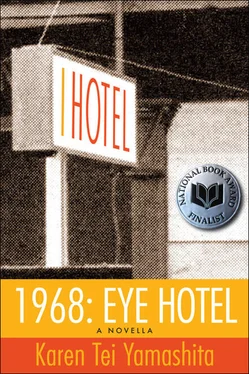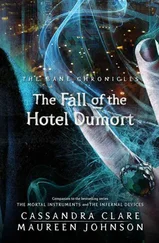I Hotel: A Novel Karen Tei Yamashita
For Asako and her grandchildren

Contents
1:Year of the Monkey
2:Language in Reaction
3:Analects
4:My Special Island
5:We
6:Tofu Tigers
7:Chinatown Verité
8:This Moment
9:Authentic Chinese Food
10:All the Things You Are
Afterword
Author’s Acknowledgments
The Illustrators
Permissions Acknowledgments
Funder Acknowledgments
Coffee House Press

So I’m Walter Cronkite, dig? And it’s February 27, 1968, and I’m saying, the U.S. is mired in a stalemate in Vietnam , and you are there.
But whoa, let’s back up twenty-nine days to the Lunar New Year. Now we know the Vietnamese call it Tet, but the Chinese own it: New Year , they call it. This year it’s significant for Paul because on this night his dad grabs his heart like it’s been antipersonnel-mined with a BLU-43, what you call dragontooth , like it was waiting there in one of those jungle paths, waiting for someone to put his toe on the de-toe-nator, and boom! There’s firecrackers busting all up and down Grant Avenue, so Paul can’t hear his dad cry out, but he’s walking behind through a narrow in the crowded festivities and the spitting lights glittering overhead only to stumble across his dad, crumpling into a laundry heap on the sidewalk.
“Ba! What is it?”
Ba has a vision as he passes: his big mistake and no atonement. “When your mother died,” he’s gasping, “for your sake, I should have married again.”
“What are you talking about? Help! We need help. An ambulance!”
“Just the two of us from that time on”—gasp—“Good son. Only child.”
“Move away! Give him air!”
“Now, my son . . . I’m sorry . . . in the world all alone . . .”
Maybe he says this, maybe not. Paul can’t hear him with all the explosions and the drumming. This Lunar New Year of the Monkey. There’s a float with everyone dressed like monkeys. They’re scurrying around with their wire tails bouncing. Every day for a hundred days, Paul tries to hear his father’s last words. Maybe he said “. . . in the world be strong . . .” Every Chinese New Year for the rest of his life, he tries to hear his father’s last words. And every year, he will hear something different.
Who’s Paul? Just one of those sensitive Chinatown kids in high school, senior at Lowell, now orphaned. Isn’t his story the story of every kid in the Year of the Monkey, 1968? Every one of us orphaned this year; just that Paul knows it first, a midnight orphan on the gung hay fat choy. Who are we to know that our black daddy Martin with a dream and our little white father Bobby will take bullets to their brains? By the end of the year, we are monkey orphans let loose, raising havoc; no daddies to pull the stops, temper the member; got those wired tails swinging from every rafter, we are free at last, brother, free at last.
On the Tet, boys back in Vietnam about to be orphaned too. Got their helmets fitting snug at the chin, faces smudged like football defenders, hugging those rifles for a sneak attack, all in camouflage like the VC can’t see them. Must be why more Vietnamese get killed than American boys: 58,000 to 3,895. Numbers for Vietnam are rounded off to the nearest thousand. Numbers for The Boys are exact. You do the math—it’s fifteen to one. We must have won. Saigon, Khe Sanh, and Hue—we get them all back. We get back the little places too, like Ben Tre and My Lai. At Ben Tre, an officer without a name says, “It became necessary to destroy it, in order to save it.” At My Lai, Charlie Company gets its orders: This is what you’ve been waiting for—search and destroy—and you’ve got it. LBJ, the CIA, Westmoreland, McNamara, the Wise Men, they all say, let us wash our hands, go quietly into that good night. Bye-bye. See you on the judgment day.
Judgment day is here already for Paul’s daddy. Wait a week to let the festivities die down, keep daddy on ice at the Cathay Wah Sang on Powell Street, over there near Jackson where the cable car makes its turn. How many ghosts hop the cable car to make the U-turn out of Chinatown? Paul makes two calls, one to Auntie and one to the Benevolent Association, and suddenly everyone goes into action like a finely tuned machine that cranks out tradition.
“My brother, what was he thinking?” Auntie wails. “He never went to the doctor. Me, I take my pills every day. Our father died the same way.”
Paul don’t know what to say. Maybe it’s his fault. Wasn’t paying attention to the old man. But how old was he? Turning sixty-five. He was supposed to live to ninety, see Paul graduate college, get married, see his grandchildren. He was betting big-time on his only son.
Auntie’s on the kitchen phone with the Cathay morticians. “My brother only has one son, and he doesn’t know anything about funerals. But why should he? He’s only sixteen.”
“I’m eighteen, Auntie.”
“Ay, how time flies. But what does it matter? He still doesn’t know anything. We’re going to have to take care of all the details.”
“Auntie, what details?”
She waves her hand at him and continues on the phone. “You know my family, well, everyone knew our father. A modest funeral, you understand? My brother was, well, why not say it, eccentric, but we are a traditional family. Yes, Ning Yung, that’s right. Someone from the Association will be in touch. I’ll be there tomorrow in the morning. Yes, my nephew will come. After all, the son should be the one to choose.”
“Auntie, choose what? And what about Ning Yung?”
“Chinese cemetery in Colma. Don’t worry. They’ll take care of everything. They’re professionals. Tomorrow there’ll be an obituary in the Chinese Times. Be sure you go and get a copy. Now, come here.”
Auntie jumps up, and Paul follows her down the corridor to the study. They walk through and over the books piled with scattered newspapers on the floor. From the desk, she picks up Dad’s reading glasses. She pulls one of his calligraphy brushes from a bamboo holder. “Here,” she says, handing the glasses and the brush to Paul. She scans the tall shelves of books that line every wall of the study. There are books in Chinese, English, and French. There’s classical Chinese literature, painting, ancient and contemporary Chinese, Western and American history, philosophy, politics, and religion. The man could read! Books are open to selected pages, annotated in the margins, wedged in every cranny of available space in the room. And behind everything else, stacked in the corners are painted canvasses. Auntie throws her hands up—“Hasn’t been dusted in years. Scandalous!”—and marches out in disgust. Paul follows obediently like a dumb puppy dog. Everything is the same as it’s always been. He can’t remember his mother’s feminine touch, her tidy ways. It’s all forgotten. He looks back at the torn leather on his dad’s old reading chair, and the way the wood floor is worn from the chair to the desk. He sees his dad pacing back and forth from the chair to the desk. No dust there. Not one speck.
But keep following Auntie. She’s on a mission down the corridor to his dad’s bedroom. She freezes at the door. Their house is a bachelor pad, so it’s a shock. Clothes everywhere. More books. More canvasses. Bed unmade. You can see the shape of his body in the wrinkled sheets. That’s where Auntie finally loses it. “My brother, you are gone,” she weeps, grabbing the dark wood of the doorframe and slipping down into abundant sorrow. Paul bows his head, stares down at his tears spattering his dad’s reading glasses and calligraphy brush. Old ink gets bloody in his young hands.
Читать дальше














